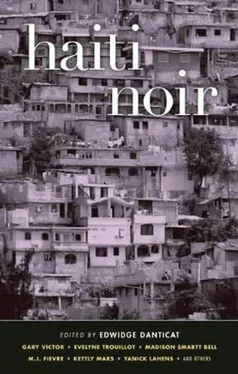I got the idea of taking a discreet little tour around the property. The uneasiness I had felt the night before was persisting. I wanted to get a better idea of the Paradise Inn. I slipped my.38 under my belt. My room, number 6, gave onto the stairway at the end of a long corridor that connected the different accommodations. I tiptoed by them. When I reached the first landing, I opened the little door that closed off the corridor. It opened onto another series of steps leading to the ground floor at the back of the house. Might as well learn what was happening down below, stage left.
I came upon a vast courtyard. The place seemed dead; everything was covered by a thin layer of dust. The courtyard faced a garden overgrown with brambles. Empty pans were waiting around the dry basin of a fountain. I couldn’t see anyone but I remained vigilant. I would have preferred to see people: the silence and desolation of the spot were giving me the shivers. I heard a noise and my heart started pounding wildly. In my whole career as a policeman, it was really the first time I’d been that scared inspecting a place. I couldn’t foresee what kind of enemy I was going to be faced with. The lady upstairs had turned on the radio. Suddenly I realized that the whole time I’d been there, I hadn’t heard the humming of a generator. I glanced at the roof. No solar panels. They couldn’t have a system that worked on batteries when there was no current to recharge them. So? And yet everything seemed to work on electricity at the Paradise Inn.
The backyard of the hotel was uninhabited. No staff, no life, no smell. I continued my tour, hugging the walls as I walked along. I opened a door. It made an eerie sound, amplified by the emptiness of the place. A bedroom with closed windows bathed in a red half-light. I didn’t go in, but I looked around. Cobwebs hanging from the ceiling. The place smelled stuffy. There were many mirrors hanging on the walls, in all dimensions. Most of them were covered with big, dark veils. I made out the shape of a motionless body in a large bed, and I could hear regular breathing.
Josiane was lying in the middle of a mess of dried flowers, veiled mirrors, and spiderwebs. Her perfume reached me despite the strong smell of mold. I was chilled to the bone. What was Josiane doing in this sinister setting? How could people live in a place without leaving any trace of life? Who were these people?
I moved on. Two other rooms had the same dusty, abandoned appearance-what used to be a kitchen and a pantry in brown ceramic tile. I thought I’d seen enough.
Yet I still didn’t know what to make of my tour of inspection. It was all muddled up in my mind. What conclusion could I draw from what I’d seen? Everything seemed frozen, fossilized. What energy was feeding this façade of life?
The lady at the reception desk greeted me as coldly as before. She suggested fried eggs and boiled bananas for breakfast. I agreed. The room was empty. No employee was bustling about to serve up the meal. My landlady appeared to do it all herself. I walked over to a table-number 5. I stumbled on something that seemed to be a foot stretched out right next to the table, but I couldn’t get a good look. I stumbled again and tried to pull out a chair to sit down, but it resisted. I looked around. What do you know? The receptionist was watching me from behind her desk. Then I remembered what she had told me and walked back to table 6, rather embarrassed. I sat down with no problem. I had to keep my eyes open. Something very fishy was happening here. I was facing extremely tough enemies. Instinctively, I felt for the gun stuck between my skin and belt.
When my hostess brought over my breakfast, I decided to have a little conversation with her.
“I saw your daughter last night,” I said.
There was no strong reaction from her. She looked me right in the eye as she answered, “Oh, yes. Were you happy with her services?”
The impudence of the question threw me for a loop. I wasn’t expecting such audacity from the woman. I answered, as naturally as possible, “Yes, she does her work very well. But doesn’t she help you with the service? I noticed you don’t have much of a staff.”
The woman smiled. An ironic smile that stung me to the quick. “Josiane only works in the evening. She takes care of room service. She has to save her energy for certain guests. Tell me, Commissaire Vanel, aren’t you satisfied with our service so far? The room doesn’t suit you?”
“Uhh, yes. I have no complaints.”
“So don’t worry about a thing. The staff here is competent and efficient. But I do thank you for your interest, Commissaire Vanel.”
I decided not to continue the conversation. I had just received a lesson in authority, in all due form. The woman was chilling. She left me powerless.
I was hungry and ate greedily.
Like the previous evening, I noticed leftovers on the other tables, but no guests. The customers of the Paradise Inn were as discreet as could be. By the time coffee came (which was very sweet, strong, and hot), I felt myself overwhelmed by the same weariness as the night before. If this went on, I’d just laze around in bed. The air of the hotel must have soporific vapors, for I couldn’t explain the lifelessness of my limbs and my will. I had to force myself to get up and head out to my car. It was time to take a drive around the town and locate the police station.
The two right tires of the jeep were flat and the vehicle was leaning to one side. This was hardly surprising: the road I’d gone down the night before could disable a tank on treads. I had to find someone who could repair the tires. There are always one or two people like that on the main street of every small provincial town. If I took the street back from the hotel, I’d surely find someone to help me. I walked for a good fifteen minutes. The whole town of Gokal was composed of one main street lined with little low houses with wooden lace cornices, all of them in disrepair and saturated with the surrounding gray dust. The road gave onto a little public square that I’d crossed the night before without realizing it. In the middle of this space rose the only tree worthy of the name, and around it was a church, a general store whose shelves seemed empty, and a few other houses in the same style as the main street. A little farther on, slightly behind the square, an open space must have been used as an outdoor market. The darker ground in this place suggested that the sale of charcoal must still support the dying economy of the town. I couldn’t see any sign of a police station. Didn’t the high command know that nothing-but nothing-happened in Gokal? On my way I only met a child carrying a bucket of water on his head, two old men sitting under the covered passageway of a rickety house, and a crippled woman squatting in a doorway. No able-bodied man in view. The situation seemed bad.
I was sweating profusely. The best thing to do was to go back to the hotel and ask my hostess for help. I didn’t like the idea. I felt I was at this woman’s mercy. But she had to know the resources of the town.
I found her sitting at the reception desk. “Look,” I immediately went up to her, “I’m sorry to bother you, madame, but I really need you to help me.”
“How may I help you, Commissaire Vanel?”
Once again I felt like a child who’d been caught out, scrutinized by an adult. What was happening to me? Normally I was the strong one. I was the one who asked the questions, doubted, pushed, intimidated people. I was the police officer, the expert sleuth. I represented authority. People were afraid of me. I knew all the methods of persuasion. What was happening to me? Why did this woman have such a strong hold over me?
I forced myself to go on. “Well, here’s the situation: I have two flat tires. So I have to find a repairman. I’m also looking for the local police station. My transfer happened pretty fast and I haven’t had time to bring myself up to speed on the town of Gokal.”
Читать дальше












